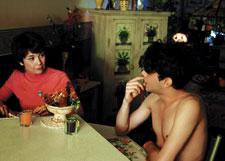
I KILLED MY MOTHER. Starring Anne Dorval and Xavier Dolan.
When his first film, I Killed My Mother (J’ai Tué Ma Mère), premiered at the Cannes Film Festival earlier this year, few people had heard of Xavier Dolan. As an actor in his native Quebec, Dolan was perhaps best known — if known at all — for his roles in Roger Cantin’s La Forteresse Suspendue, or for providing voice work in French-dubbed versions of Twilight and High School Musical. But amid a storm of media attention placed on cinematic giants like Lars Von Trier and Quentin Tarantino, Dolan managed to steal headlines at Cannes when I Killed My Mother — after receiving an eight-minute standing ovation at its first screening — won every award it was eligible for. The press jumped on Dolan’s story, not simply because of his impressive award count but because of an unexpected item in his biography: He’s only 20 years old.
Anyone suspicious of the attention Dolan — who also wrote, produced and stars in the film — has received due to the fairytale nature of his backstory will soon find themselves shamefully mistaken. Dolan’s sizable maturity and self-assurance as a filmmaker is clear in every frame of I Killed My Mother, which is having its English Canada debut at the Toronto International Film Festival on Tue, Sep 15.
Largely autobiographical, the film details the intensely volatile relationship between a gay 16-year-old, Hubert (Dolan), and his mother, Chantale (the extraordinary Anne Dorval). The film builds through a series of richly hysterical conflicts that find these two characters exceedingly incapable of living with or without one another. Perhaps a viciously honest love story more than anything else, I Killed My Mother gives us an acute and compassionate portrayal of both sides of this complex human interaction.
Dolan wrote the script for the film when he was 17, fresh from a decision to drop out of college. Meant more as a “cathartic exercise” than anything else, in just three days he managed a first draft. “Then I put it in a drawer and waited,” he says. “A friend ended up reading it and told me that it was a great script and that I should really consider taking it seriously. At the time, I was working on other, very mediocre projects, and the fact that he liked the script so much augured well for my ambition. I just abandoned those other projects and focused on I Killed My Mother.”
But the film ran into significant problems in development. Telefilm Canada and Quebec’s cultural funding agency SODEC both initially refused the project, leading I Killed My Mother’s initial distributor and producer to back out.
“All of a sudden I was alone with it,” says Dolan. “So I decided to just invest all of my savings and reached out to my family and friends and colleagues, asking them for a little money to invest in the movie. And they really helped me. I had this whole, what I like to call ‘love money’ thing going on. And I gathered something like $25,000, just from love money.”
Dolan’s love money donors were well aware there was no guaranteed return on their investment. “No one could foresee what would happen,” he says, “and I didn’t think would happen. I mean, I wanted to go to Cannes and I dreamt of it. But when I asked them for their help, it wasn’t written in the sky that the project would ever work or that it would ever be distributed in theatres or even go to festivals. It could have just been a little project, but they still believed in it.”
The fact that I Killed My Mother did become much more than a little project has found Dolan exposing himself — both metaphorically in its autobiographical nature and physically in its plentiful seminudity and one memorable paint-themed sex scene with his onscreen boyfriend — to a much more substantial audience than he might have expected. But that’s not something Dolan seems uncomfortable with.
“I just feel like if this vulnerable side of myself wasn’t in the movie, then it wouldn’t be what it is,” he says. “I think that the movie needed this very intimate side of it to be credible or to be touching. I thought if I exposed myself like this people would penetrate my intimacy or the intimacy of the movie.”
Dolan also exposed what could be seen as a generational shift in gay-themed filmmaking. His on-screen persona is never particularly preoccupied with his sexuality and it essentially serves as background information for the film’s more dominant themes.
“I feel like we’ve reached some point of evolution where we don’t need to claim things,” he says. “I don’t take for granted that people accept homosexuality, but I didn’t feel the need to put that much importance on Hubert being gay.
“I think that movies that discuss gay identity are often too explicative or demand too much from society. I didn’t feel the need to put so much emphasis on it. This is not a movie about a ‘queer boy’ exploring his ‘queer life.’ It’s a movie about a son and his mother.”
These ideals derive — as one would expect from a semiautobiographical film — from Dolan’s own experiences. “For me personally,” he says, “it wasn’t that hard. My life isn’t that complicated. I’m not from a Baptist church in Tennessee. When I told my mother and my father and the people close to me it never felt like it was going to break their heart or they were going to spray cold water on me. Since I didn’t live things that way, I didn’t feel the need to put that much importance on it in the film.”
There is one scene in the film, however, that stands apart from Dolan’s professed comfort zone. Toward the end of the film, Hubert is attacked outside a boarding school. Though it’s never explicitly mentioned as resulting out of homophobia, there’s certainly a suggestion.
“I’ve been a victim of gay bashing, and I felt the need to talk about it in the movie,” Dolan says. “Maybe it was a mistake. Maybe it wasn’t necessary in the context of the movie. A lot of people think it’s a very spontaneous moment and it can seem… unexpected. And maybe they’re right. But it was part of this whole world I was trying to portray in this film. So I didn’t want to exclude it.”
Dolan is excited to bring I Killed My Mother to Toronto, but is somewhat apprehensive about the attention he’s been receiving and will surely continue to receive as the film begins to open in theatres around the world (it’s set to open in 14 different countries so far).
“It’s happened too fast,” he says of the time since Cannes. “I mean it’s unreal, but it’s real at the same time. It’s like I couldn’t live it. There was so much going on in so little time, it felt like this very rapid storm. And, yes, my life’s changed. I’m not sure I’m made for this world yet.
“But I still want to make art, and see movies, and just try and be a cultured person. I’m just trying to shovel my way through young adulthood.”

 Why you can trust Xtra
Why you can trust Xtra


